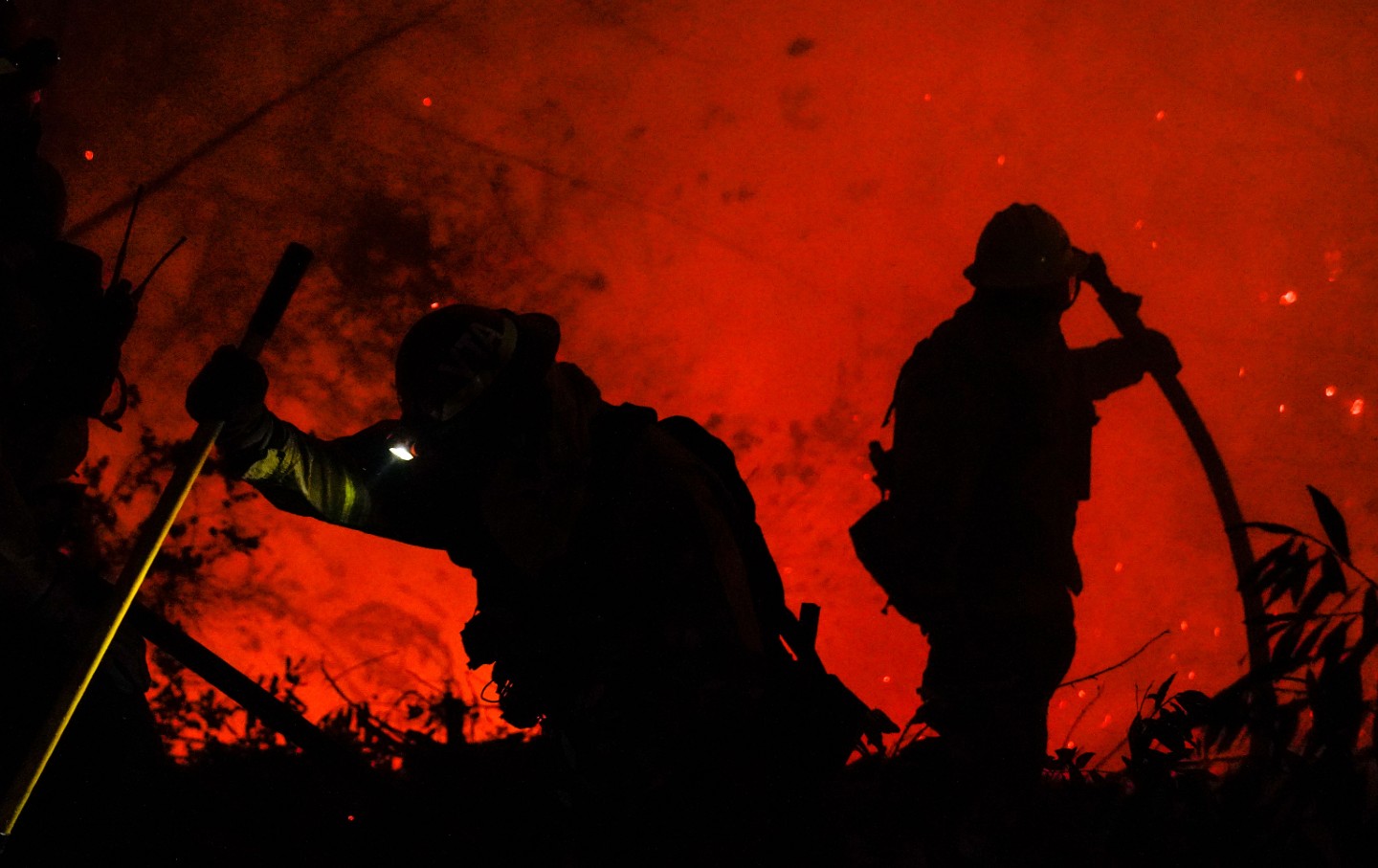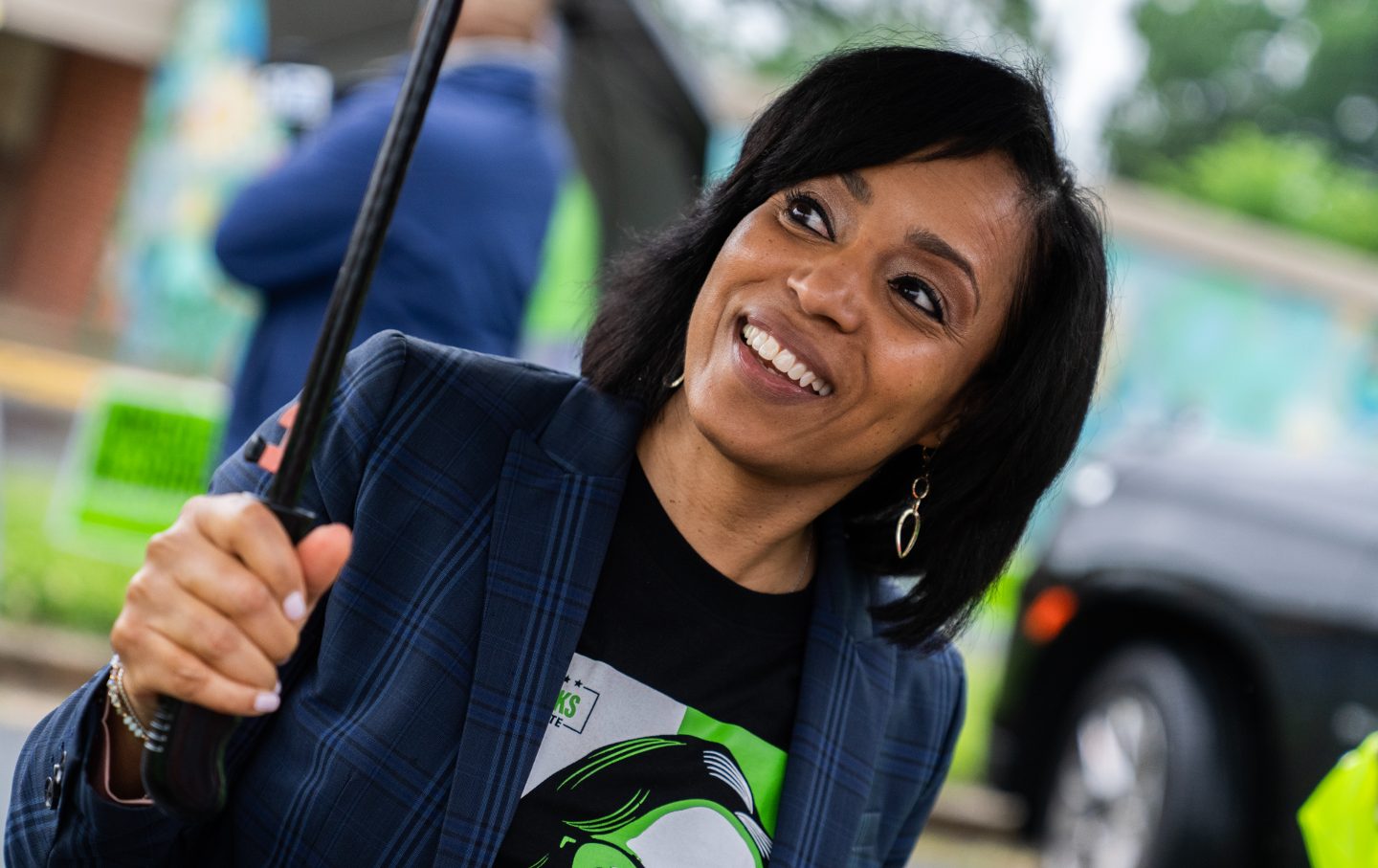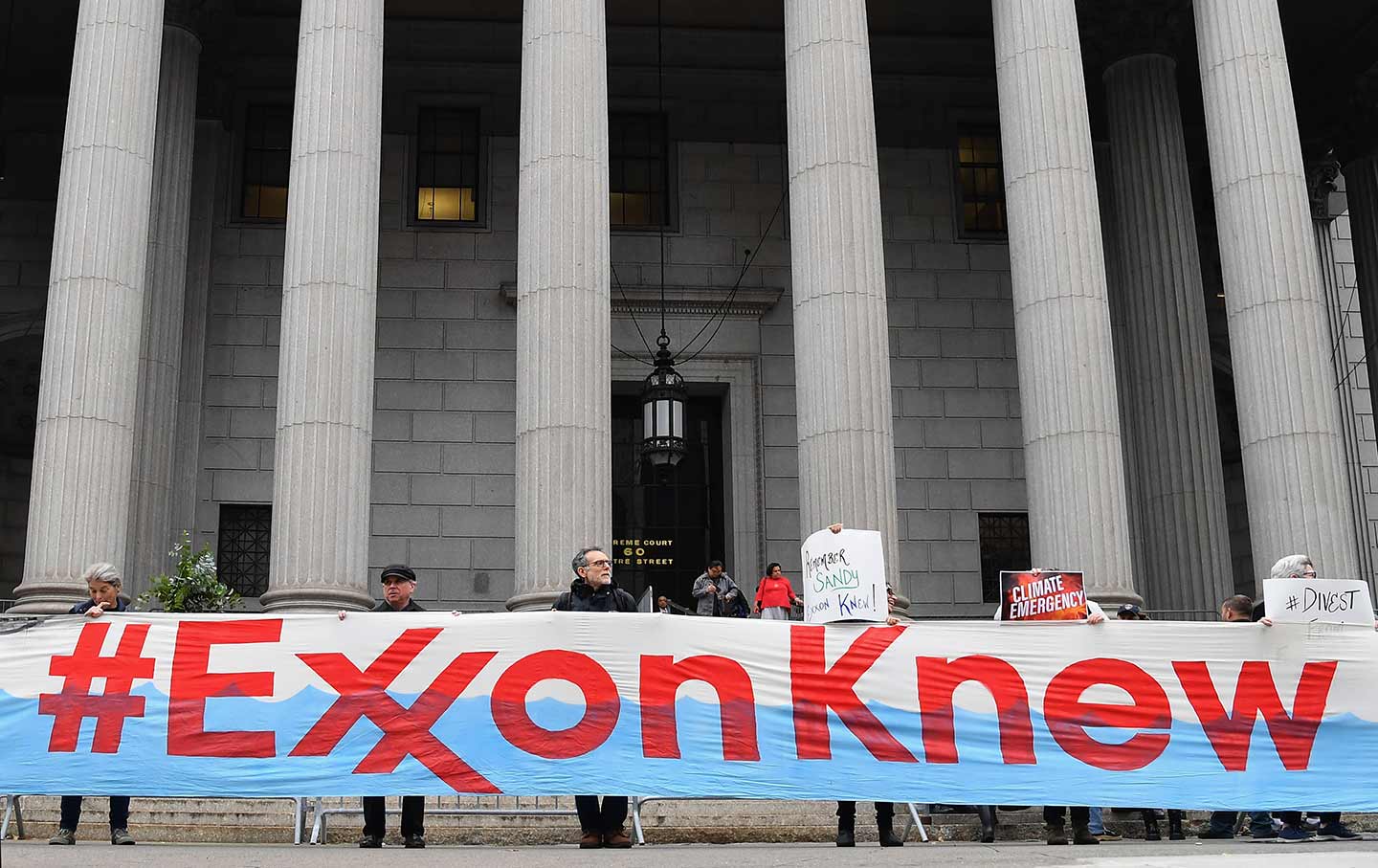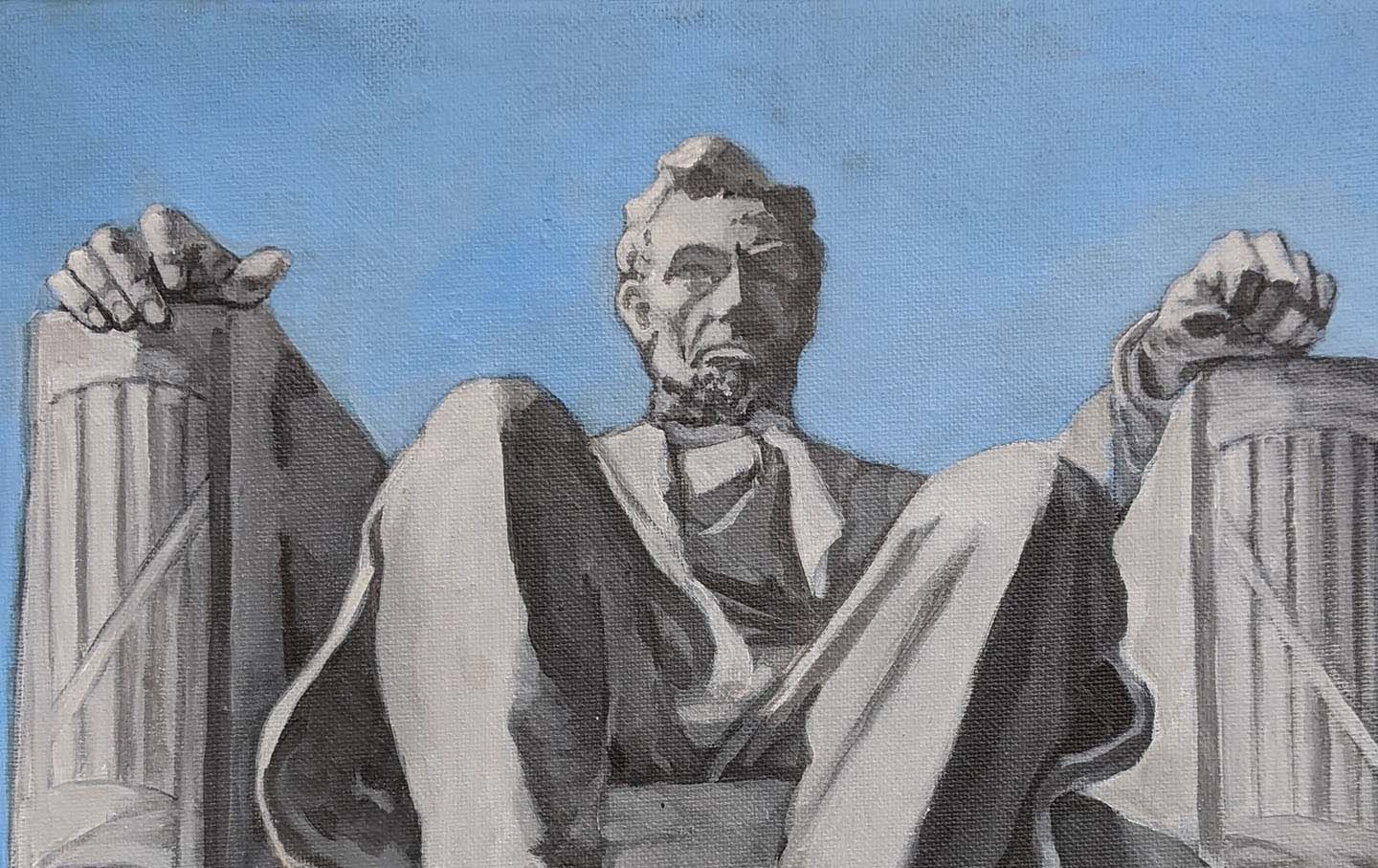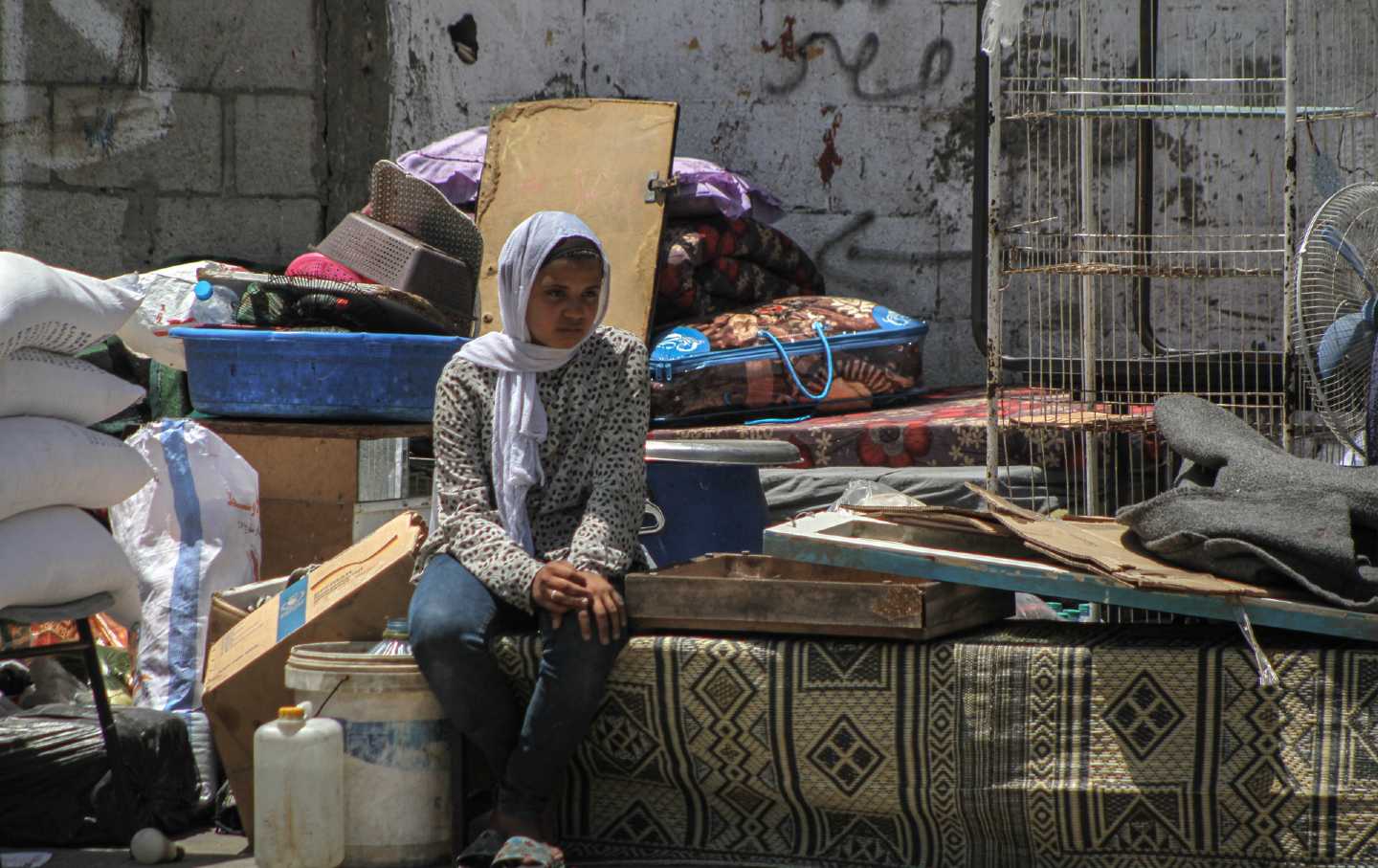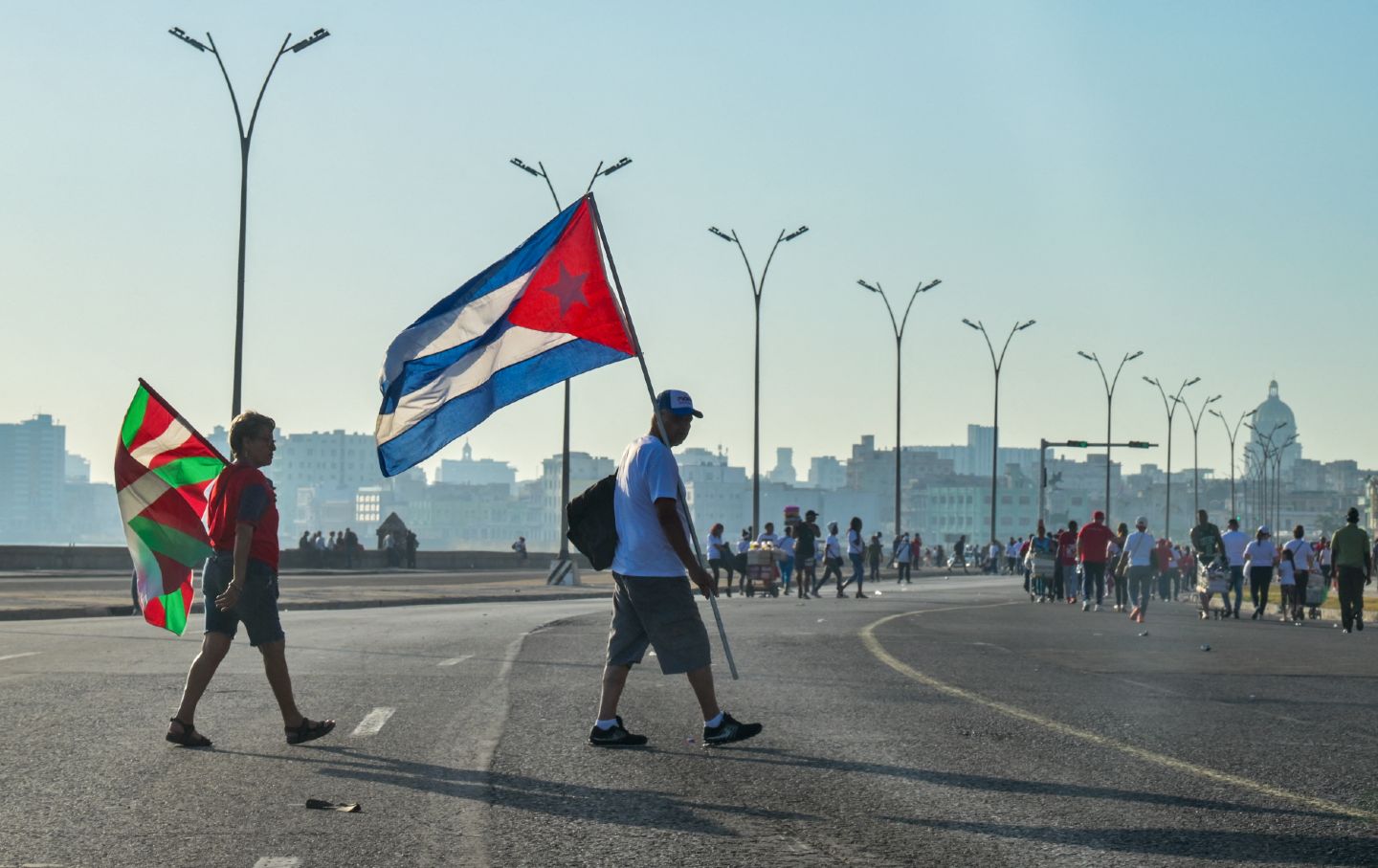At Emory University, Cops Are Using a Sledgehammer to Swat a Fly
Atlantans have been protesting Cop City for years. Now the city’s notorious police forces are raiding its college campus.
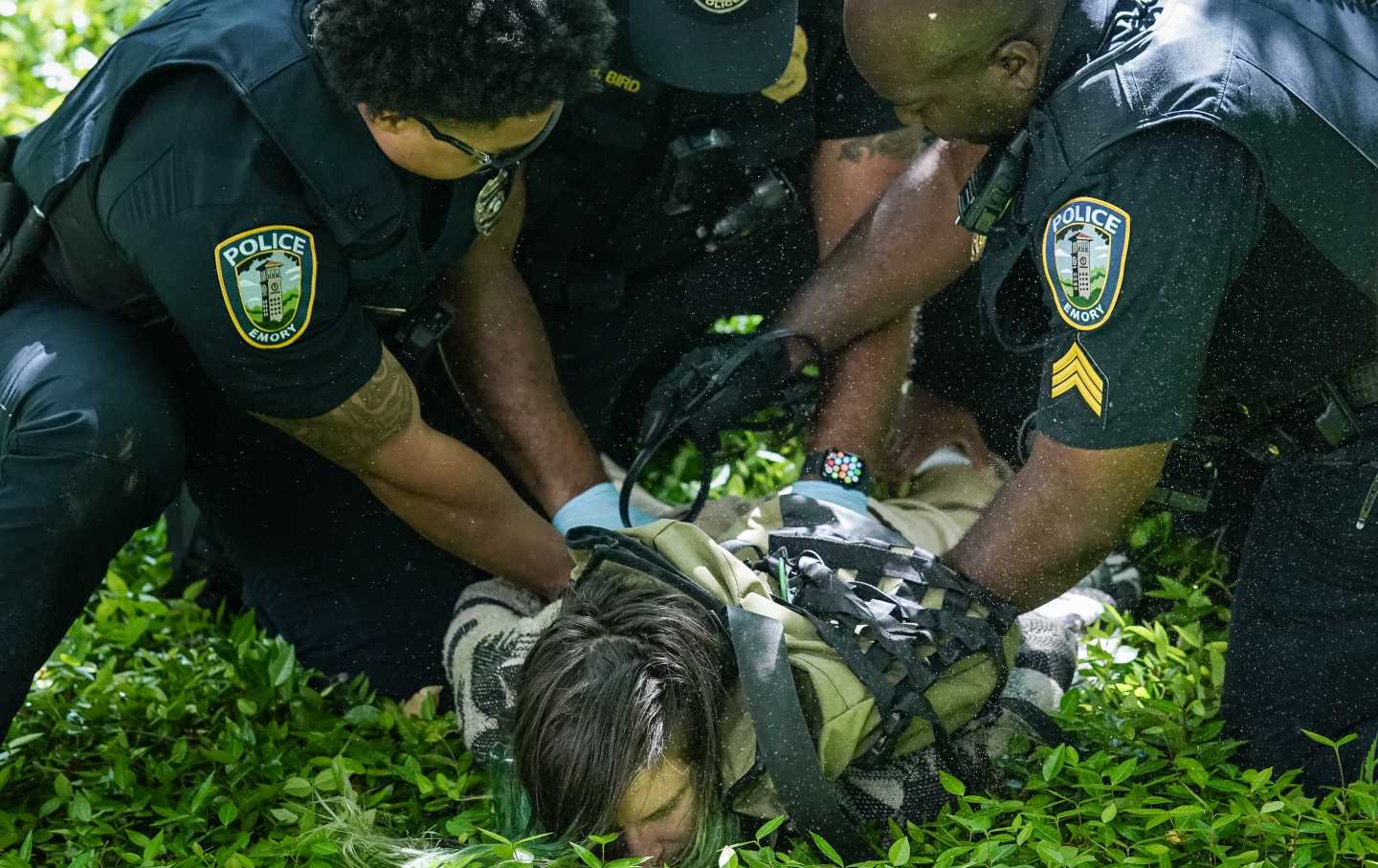
Police officers detain a demonstrator during a pro-Palestinian protest against the war in Gaza at Emory University on April 25, 2024, in Atlanta, Georgia.
(Elijah Nouvelage / Getty Images)Maybe you’ve already seen the video of Dr. Noëlle McAfee, the chair of the Emory University Philosophy Department and the president-elect of the Emory Senate, being frog-marched out of a university building in handcuffs by an Atlanta Police officer wearing a balaclava. The student filming the video asks if they can do anything, and McAfee responds, calmly, “Can you call the philosophy department and tell them I’ve been arrested?” Her arrestable offense? Coming upon a police officer “pummeling” a student and refusing to walk away.
The morning of April 25 was cool and lovely in Atlanta. Spring is in full bloom, and the scent of honeysuckle often hangs in the morning air. A little after 7 am, a group of people—Emory students joined by community members and students from surrounding universities—bound together to join the nationwide movement of students and organizers erecting encampments with the purpose of demanding that their schools divest from financial relationships with Israel. In the case of Emory, a mid-sized, private university in Atlanta, people were also protesting against the construction of the police training facility known as Cop City—a demand from the greater-Atlanta community that has been consistent since plans to raze forest land to build the expensive, unpopular project were announced in 2021. “Divest from Death,” a banner hung on one of Emory’s stone buildings read. “No Genocide and No Cop City.”
For an almost comically short period of time, the protesters and their encampments were alone on the quad. But Emory University President Greg Fenves, against the urging of some of his own faculty, called the cops fast. He knew exactly what he was doing: calling in state and city police forces that have, among other things, killed a 62-year-old deacon at a traffic stop, sexually harassed people during raids of Cop City opponents’ homes, killed a forest defender sitting in a tent in the woods, tore two students out of their car, tased them, and smashed their windows for a “curfew violation,” is a direct threat. Arrested students would be sent to the Dekalb County Jail, or “DeKalb County Hell,” one of the deadliest jails in the country.
By 8 am, the quad was swarming with officers from a trifecta of police agencies: Emory Campus Police, Atlanta Police, and Georgia State Patrol. Given Georgia’s history, it’s not at all surprising that an Atlanta-area university was, compared with other schools, the quickest to call the cops. Within minutes, police had wreaked havoc on the quad. They threw tear gas, fired pepper balls, and repeatedly tased a Black medic after he had already been handcuffed and thrown to the ground. Dr. Caroline Fohlin, a well-known economics professor who happens to be married to the dean of students, came over to a group of officers who had a student pinned to the ground. “What are you doing?” she asks incredulously. Almost immediately, police turn around and slam her down on the concrete. Her glasses are knocked askew; she cries out, almost in disbelief, “I’m a professor!” She was charged with battery. A professor of English, Dr. Emil’ Keme, was tackled on camera as he was walking across the quad. “I literally felt that I was in a war zone,” he told Democracy Now! Multiple Black students and organizers are seen being carried off by police, screaming. This is exactly what Stop Cop City organizers feared when they warned the city about the risks of further militarizing already-violent police forces.
The connection between Cop City, Israel, and Atlanta-area universities are stronger than you might guess. “The parallels,” Atlanta organizers write, “extend deeper into the mechanisms of oppression, where the tactics employed to suppress dissent in Atlanta echo those used globally, facilitated by significant international collaboration in policing and surveillance.” First, there’s the fact that Cop City is being built nearly in the mold of the Israeli Urban Warfare Training Center (UWTC) or “Mini Gaza,” as it is unaffectionately known. UWTC is, according to the IDF’s website, a “training facility to answer the IDF’s needs for modern urban warfare training.” It simulates an “…authentic, modern desert city,” complete with “fully-populated complexes to shabby shacks, schools, city-stores, public buildings and market places.” On the Atlanta Police Foundation’s website, Cop City is described as a “state-of-the-art facility, complete with “a mock streetscape to simulate real-world crisis situations faced by law enforcement officers.” One wonders whether a mock campus-quad will be added to Cop City blueprints.
Then there’s the Georgia International Law Enforcement Exchange. GILEE, which has been housed within Georgia State University for over 30 years, is basically just what it sounds like: a foreign exchange program for cops. While GILEE technically works in multiple countries now, the primary relationship is between Israel and various Georgia police agencies. The organization’s website will tell you about “enhancing homeland security efforts through international cooperation and training programs,” but in less war-machine-PR-language, GILEE is all about Israeli and US police forces trading tips on how to manage and crack down on communities with a de facto racial underclass.
Over the last three years, those opposed to Cop City have had all their arguments upheld and their worst fears confirmed. Organizers were worried about protesters’ getting killed—then Georgia State Patrol officers murdered Tortuguita, a forest defender, while they were sitting in their tent on public land. There were fears about unnecessary arrests and trumped-up criminal charges, and since 2021, police have brutalized and arrested scores of people opposed to Cop City, including over 60 who have been ensnared in a bogus RICO prosecution. Environmentalists warned of the catastrophic impacts the building of Cop City would engender. The roads surrounding the construction site have already been rendered impassable due to flooding multiple times over the past few months. A lawsuit was filed over the pollution of the South River as a result of current construction.
Repression of anti-war or anti-police movements on college campuses (and beyond) is obviously not a new phenomenon. There has, rightfully, been lots of talk about the student protests of the 1960s and ’70s. But there is a key difference between then and now: The police forces responding to campus protests today are not the same as those who showed up to Columbia in 1968, and they’re not the same as those who showed up to post 9/11 anti-war demonstrations. Even small-town police forces today more closely resemble the armed-to-the-teeth National Guard who showed up to kill kids at Kent State in 1970. On campuses across the country, but particularly in the South, we are seeing the kind of violence that no training at Cop City would mitigate.
Suppressing dissent or rebellion has always been foundational to policing, but militarization really started in earnest in the 1970s, and that timing is not coincidental. The first SWAT (Special Weapons and Tactics) teams emerged in the 1960s. Cops would like you to think, in part, that this was to keep students safe on campuses: Police lore cites Charles Whitman’s killing spree from the University of Texas watchtower as seminal to the creation of more militarized police forces. There were other reasons, too: uprisings and protest movements throughout the ’60s, particularly LA’s Watts Rebellion. Amid those uprisings, the chief of the LAPD compared anti-war/anti-imperialism protesters to the Viet Cong: Not so far off from the politicians, police officials, and talking heads endlessly accusing today’s anti-genocide protesters of “pro-Hamas propaganda.”
What transpired at Emory last week is exactly why Atlantans don’t want Cop City. It’s what we have been protesting for three years. When untold sums of public money and state propaganda have been invested in militarized policing, militarized police become the answer to everything. The SWAT vehicles, tasers, pepper balls, bulletproof vests, guns, and tear gas and the cops’ time were paid for with funds that should have gone toward things like healthcare, bridge repairs, universal pre-K, and access to healthy food.
At a Cop City action last fall, protesters showed up with large puppetry and gardening tools to plant sapling trees, and the cops showed up with, among other things, SWAT vehicles, sound cannons, tear gas, and a dog in tactical goggles. It’s just as ridiculous a response as sending in scores of adults in tactical gear with weapons of war to disperse a group of young people, tired of reading about children being obliterated by the thousands, sitting on a lawn. When all you have is a hammer, all you see are nails.
Thank you for reading The Nation!
We hope you enjoyed the story you just read, just one of the many incisive, deeply reported articles we publish daily. Now more than ever, we need fearless journalism that moves the needle on important issues, uncovers malfeasance and corruption, and uplifts voices and perspectives that often go unheard in mainstream media.
Donate right now and help us hold the powerful accountable, shine a light on issues that would otherwise be swept under the rug, and build a more just and equitable future.
For nearly 160 years, The Nation has stood for truth, justice, and moral clarity. As a reader-supported publication, we are not beholden to the whims of advertisers or a corporate owner. But it does take financial resources to report on stories that may take weeks or months to investigate, thoroughly edit and fact-check articles, and get our stories to readers like you.
Donate today and stand with us for a better future. Thank you for being a supporter of independent journalism.
Thank you for your generosity.

